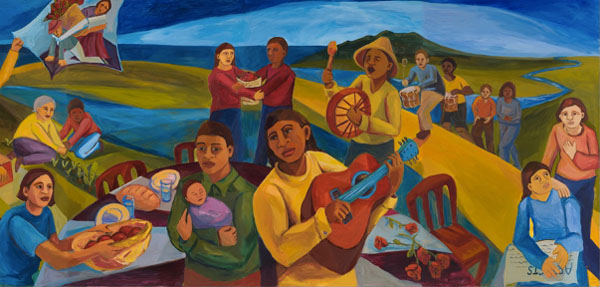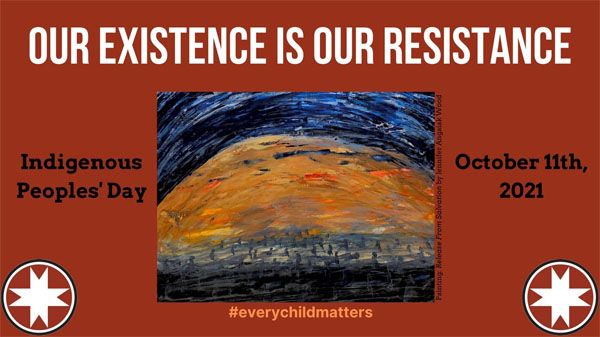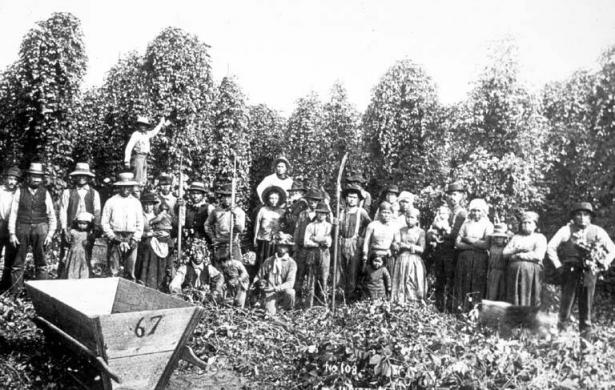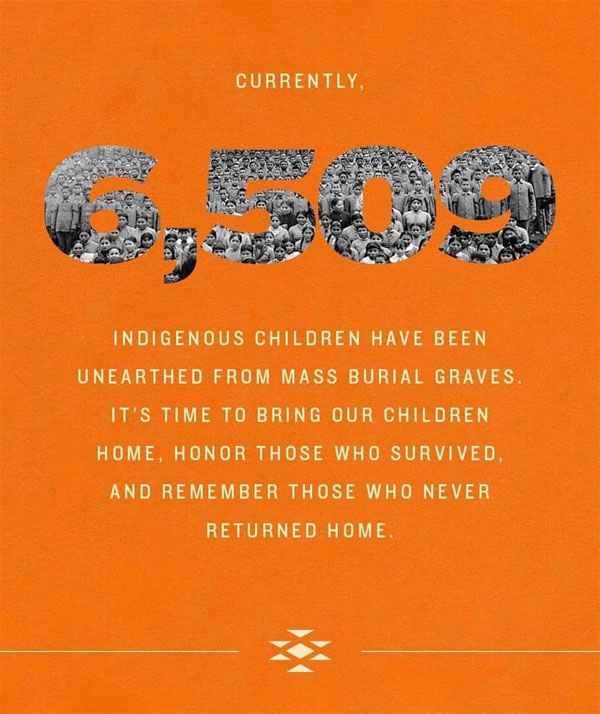On Indigenous Peoples’ Day — this year on Monday, Oct. 11 — we not only honor the people of the land that we live on, but the work that Indigenous people continue to contribute to our labor history throughout the region.
Indigenous people are more than the first people of Washington, we were the first workers. Treaties removed tribes from their ancestral lands to reservations, including what is now known as the Yakama Nation, in 1855. In the late 1800s onward, migration took place every year by foot, wagon, horseback or canoe bringing thousands of Duwamish, Sammamish, Lummi, Tlingits, and Haidas to the fields.
Indigenous or “Native” laborers were valued by farmers in Yakima for their work ethic and for being Indigenous, and not Chinese, for whom public anti-sentiment was growing strong (result of the Chinese Exclusion Act). This gave them an edge in negotiating wages and working conditions, serving as an example of using race to divide workers, at the benefit of the ruling class.
As hop picking was a time-sensitive operation, farmers couldn’t afford unhappy workers or they would lose their crop. In 1894, workers in the Moxee Valley, almost entirely native Yakama women, stopped working, demanding a 25 cents raise per hop box picked. The farmers raised the pay to $1.12 ½ per box, ending the dispute the same day. Two other recorded protests over the enlarged hop boxes were victorious within a day, major victories for the female Native laborers. (Learn more about this history included in Washington State Labor Council’s Jackson Street Workers Mural and the Race to Labor booklet.)
By contrast, an exclusion ordinance was enacted in Seattle in 1865. It read, “Be it ordained by the Board of Trustees of the Town of Seattle, That no Indian or Indians shall be permitted to reside, or locate their residences on any street, highway, lane, or alley or any vacant lot in the town of Seattle, from a point known as the South side of Chas. Plummer’s ten acre lot to a point known as the South side of Bell’s land claim” (Seattle Weekly Gazette).
This was followed by a second section stating, “All persons having in their employ any Indian or Indians within the corporate limits of said town shall provide lodgements or suitable residences for the said Indians during the time of said employment, on, or immediately attached to their own place of residence” (Seattle Weekly Gazette).
In other words, the Duwamish were not allowed to live in Seattle — unless a non-Indian needed to employ them. Their ability to return to their ancestral lands was not only tied to their employment, but at the determination of white settlers. Exclusion by law and the “othering” of people by race continued through the practice of redlining — impacting Black, Indigenous and people of color in neighborhoods such as the Central District of Seattle and Tacoma’s Division Avenue. (Learn more about MLK County’s “Native American Expulsion Remembrance Day” in articles by Indian Country Today, HistoryLink and Seattle Civil Rights and Labor History Project.)
Fast forward to today. We continue to battle racism, COVID-19 and the fact that our world is literally and figuratively on fire. However, my niece and family reminded me in the days leading up to Sept. 30, Orange Shirt Day, that we must speak up about our past and present, as we honor Boarding School survivors and our survival #everychildmatters.
October is also Domestic Violence Awareness Month. COVID-19 has contributed to an increase in domestic violence around the world. For American Indian and Alaskan Native women, the statistics are staggering but for many of us, it is our lived reality that we carry for generations. Over 4 in 5 AI/AN women, men and people have experienced violence in their lifetime, including our youth. In addition, our Two Spirit & LGBTQ+ siblings and disabled family members also fall victim to domestic violence. We bring these lived experiences to school, to work and back home every day — it’s only when we have the space to talk about it, that we can begin to heal. This is a part of the culture shift needed to help our unions and our labor movement some day be those spaces for our members and future members.
On Indigenous Peoples’ Day 2021, we have the opportunity to use a “holiday” for collective learning and collective action. To Indigenous people who must work this day, we thank you and honor your work and your existence. To immigrant workers and families who are also fighting to be seen and heard in places like Yakima, we stand with you as our struggles are connected. I lift my hands in thanks to my family and ancestors who made it possible to share these words, gunałchéesh.
The observance of Indigenous Peoples’ Day continues to grow across the United States, including right here in Washington. Cities such as Olympia, Seattle, Spokane, Yakima, Edmonds, Bainbridge Island, Bellingham (Coast Salish Day), Everett, Snohomish County and the Seattle School Board have proclaimed the second Monday in October, Indigenous Peoples’ Day. Here at the WSLC, union staff and leaders negotiated and ratified language now recognizing Indigenous Peoples’ Day, Juneteenth and Veterans Day as paid holidays.
This would not have been possible without the time, energy and labor of Indigenous leaders locally. The United Indians of All Tribes Foundation and Daybreak Star Indian Cultural Center (learn more about their history of indigenous activism and occupation here), reminds us that “prior to the recognition of Indigenous Peoples’ Day in Seattle, a group of indigenous organizers led marches and protests in downtown Seattle on Columbus Day from 2009-2014. In 2014, team of Native activists and allies successfully advocated for the City of Seattle to recognize the second Monday in October as Indigenous Peoples’ Day. That year, United Indians hosted Seattle’s first Indigenous Peoples’ Day celebration.”
Resolutions declaring the day across the state encourage all people, businesses, organizations and public institutions to learn about, celebrate and support the cultures of Indigenous peoples of our region.

Image from the Jackson Street Workers Mural at the WSLC Seattle office.
WSLC resolutions that were drafted and passed with the support of Indigenous labor leaders:
● Missing and Murdered Indigenous Women (MMIW): 2019 WSLC Resolution #19 brought attention to the MMIW epidemic in Washington, which has the second-most opened unsolved MMIW cases of any state in the U.S. The city of Seattle has the highest rate of MMIWG as compared to other cities in the United States, according to a study by Urban Indian Health Institute, a project of Seattle Indian Health Board.
● Tribal Acknowledgement: 2019 WSLC Resolution on Race & Labor 3.0 “The WSLC will begin this effort to acknowledge what has been buried by honoring the truth that we are standing on the ancestral lands of many Indigenous, Tribal communities and/or First Nations people and the WSLC will begin all public events with a Tribal acknowledgement.”
● In Support of Council Fire and Native American Workers: 2017 Resolution #9 states “Native American tribes have a centuries-old kinship with the Indigenous peoples of all North, Central, and South American countries, as they share the same lands for many generations before they were subjected to the practices of genocide and bounties… (and) that the Washington State Labor Council proclaims solidarity with the Indigenous Peoples, the original occupants of the Americas.”
● Has your union local or committee passed similar resolutions, organized groups or other efforts in support of Indigenous solidarity? Email kperreira@wslc.org as we hope to connect more Indigenous labor leaders across the state to do just that — lead!

Virtual Events in celebration of Indigenous Peoples’ Day 2021:
Indigenous Peoples’ Day at United Indians of All Tribes Foundation:
- This year, Indigenous Peoples’ Day at UIATF is going hybrid! Of course, we hope to be able to gather safely together in person again soon. For now, though, we’re thrilled to bring you a virtual celebration with talented dancers, singers, and speakers. We will remember all those who endured the residential schools, honoring the survivors. We will also celebrate resilience and healing.
- The virtual event will begin at 2pm live on Facebook. Stay up to date by following our Facebook event page, and watch there live on the day! Remember to invite your friends!
- ***IN ADDITION to our virtual event, we will host a drive-through at Daybreak Star. Drop by from 12pm – 3pm to pick up a bag containing an #everychildmatters t-shirt and bracelet, a candle, and a small snack. While supplies last: limited quantities available.***
- Special thanks to Group Health Foundation, City of Seattle, Na’ah Illahee Fund, and 4Culture for supporting this event!
Indigenous Peoples Festival at Seattle Center:
- Indigenous Peoples Festival is part of the Virtual Festál Series with generous support from 4Culture. The 2021 theme, “Where the World Gathers” links together the series of 24 free festivals presented throughout the year, each with a unique cultural focus, identity and a range of engaging activities.
- Indigenous People Festival is a celebration of Indigenous creativity, brilliance, and resilience. This year, they’ll present four exciting days of virtual performances and panels featuring locally and nationally recognized Indigenous artists and advocates.
- Funds raised through Indigenous People Festival 2021 will help Seattle Indian Health Board expand their culturally attuned services, open new locations, and renovate their Leschi Center to include upgraded medical rooms, 100 affordable housing units, and new spaces for our Elders’ Program and cultural gatherings.
- Online Events:
- October 12 @ 6:30pm The Performance
- October 13 @ 4:00pm / 5:00pm I See You: Black Natives in Discussion / The Performance 2020 Replay
- October 14 @ 4:00pm / 5:00pm Boarding School Survivors: Healing. Hope. Justice. / Rez Dogs and Rutherford Falls: NDN TV Time
- October 15 @ 5:00pm / 6:30pm Native Chefs: Indigenous Food is Sovereign / The Concert
Kasi Marita Perreira is Director of Racial and Gender Justice for the Washington State Labor Council, AFL-CIO.



Spread the word